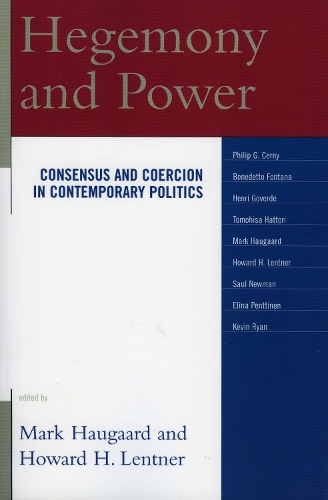
Hegemony and Power: Consensus and Coercion in Contemporary Politics
(Paperback)
Publishing Details
Hegemony and Power: Consensus and Coercion in Contemporary Politics
By (Author) Mark Haugaard
Edited by Howard H. Lentner
Contributions by Benedetto Fontana
Contributions by Philip G. Cerny
Contributions by Howard H. Lentner
Contributions by Henri Goverde
Contributions by Elina Penttinen
Contributions by Tomohisa Hattori
Contributions by Saul Newman
Contributions by Kevin Ryan
Bloomsbury Publishing PLC
Lexington Books
19th August 2006
United States
Classifications
Professional and Scholarly
Non Fiction
International relations
327.112
Physical Properties
Paperback
262
Width 152mm, Height 229mm, Spine 19mm
476g
Description
This book provides the first systematic examination of the relationship of hegemony and power. Nine essays delve into the diverse analytical aspects of the two concepts, and an introduction and conclusion by the editors, respectively, forge a synthesis of their theoretical coherence. Hegemony has long existed as a term in political science, international relations, and social theory, but its meaning varies across these fields. While each has developed its own 'local' language games for treating the idea, they all conceptualize hegemony as a form of power. Building on the recent rigorous exposition of power, this book subjects hegemony to a clarifying debate. In doing so, it advances the power debate. Components of the literature assume a relationship between power and hegemony, but no previous work has performed a concentrated and consistent analytical examination of them until now.
Reviews
Hegemony, as the book establishes, is one of the most widely used concepts in the social sciences. It is also one of the most diffusely specified, not only by different disciplinary approaches but also different traditions within and amongst them: from Gramsci the concept has been widely used by neo-Marxists, international relations, social and political scientists, cultural studies, and so on; it has been subject to substantial revisions from Laclau and Mouffe onwards, and it remains central to any understanding of power in the contemporary world. Hegemony and Power provides a masterly key to understanding diverse applications of these absolutely central concepts. -- Stewart Clegg, University of Technology, Sydney
Author Bio
Mark Haugaard is a lecturer in the Department of Political Science and Sociology at NUI, Galway.
Howard H. Lentner is Professor Emeritus in the Department of Political Science at City University of New York.
